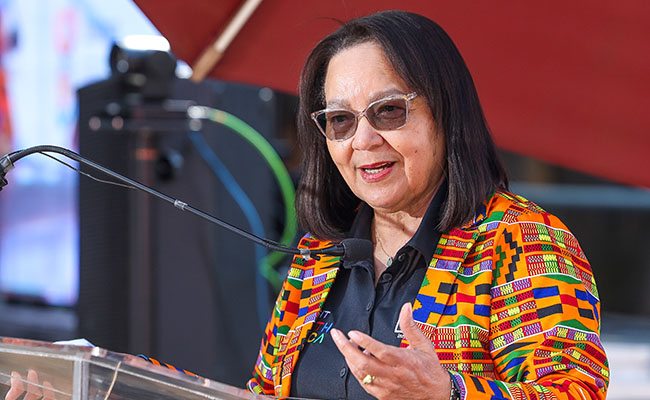For the second time in as many years, the SA Tourism board has been axed – a distressing record for an organisation that’s meant to be stabilising a long-suffering sector that supports upwards of 1.6-million jobs.
There’s no small irony in the matter. This is a board that tourism minister Patricia de Lille herself put in place. Back in 2023, De Lille constituted a new board after axing the previous one for its decision to sponsor English Premier League side Tottenham Hotspur for a cool R1bn. Then, after removing the chair and deputy of her new board, citing “excessive meetings”, De Lille appointed new directors after six resigned last September.
This time around, the issue relates to the board’s suspension of SA Tourism CEO Nombulelo Guliwe. The decision stems from the CEO’s apparently unlawful suspension the company’s chief marketing officer and company secretary – who reports to the board – going against the principles of fair labour practice and good governance, the board’s Lawson Naidoo told Moneyweb.
There’s also the issue of an irregular R4.1m prepayment for the 2021 Dubai Expo – flagged by the auditor-general as a material irregularity – when Guliwe was CFO. A subsequent forensic audit into the matter recommended disciplinary action.
Based in part on this resolution to suspend the CEO, De Lille summarily dissolved the entire board. In her view, the board had violated the Tourism Act and board charter by convening an “irregular” meeting on August 1, and by adopting the resolution to suspend Guliwe, in the absence of a board chair.
This after chair Gregory Davids resigned in July, two weeks after the board reportedly passed a vote of no confidence in him. The board apparently requested that De Lille appoint a new chair – to no avail.
The board, for its part, claims “the minister has employed diversionary tactics to frustrate the board, and ultimately dissolve it without providing a lawful good cause as is required by the Tourism Act”, Naidoo told the Sunday Times yesterday.
‘A failure of governance’
To many, De Lille’s rationale looks questionable – a bureaucratic excuse masking political overreach, and an exercise in frustrating a board taking seriously its oversight responsibilities.
“The situation raises several concerns regarding a failure of governance. A minister should not undermine the role of the board,” says Stephen Sadie of the Chartered Governance Institute of South Africa.
“The minister gives the impression that she is protecting the suspended CEO rather than supporting the board who are responsible for hiring, overseeing the work of the CEO and, if necessary, also firing the CEO.”
It’s a sentiment echoed by Wayne Duvenage, CEO of the Organisation Undoing Tax Abuse (Outa), who says it seems De Lille is shielding Guliwe from investigation.
De Lille, however, tells Currency that she has no problem with the board investigating the misconduct allegations. In fact, she says, she had previously lamented the board’s failure to investigate complaints against Guliwe.
Duvenage doesn’t buy it. “This is a classic situation of political interference in operational matters. We believe this minister gets far too involved in the operations of SA Tourism and goes over the board’s heads,” he tells Currency. “This is what happens when such overreach takes place. This minister is grossly out of line.”
Outa’s advocate Stefanie Fick, in turn, points to the murky legal waters that give ministers far too much power. “I think legislation provides a breeding ground for political interference”, she says.
As set out in the Tourism Act, both the minister and the board have the power to appoint a CEO. “And guess what happens when a minister doesn’t get [their] way … this enables ministers to appoint whom they deem fit and the people that will comply, in some cases for nefarious reasons.”
According to Fick, the regulations (or lack thereof) that guide most public entities that do not fall under the Companies Act allow ministers to interfere with appointments and operational decisions.
And where ministers have been able to freely interfere, cases of patronage networks and captured boards may occur, Duvenage warns. “The core concern is that when ministers control appointments, they can bypass merit, professionalism and independence, creating boards that serve political agendas instead of the public interest.”
The old ministerial playbook
It’s no surprise South Africans are cynical. The fact is, dissolving the board has been a step taken by many a disreputable minister, particularly during the years of state capture.
Take passenger rail agency Prasa, where then transport minister Dipuo Peters fired the entire board, chaired by Popo Molefe, in March 2017. This despite the board uncovering R14bn of irregular expenditure and instituting investigations into corruption.
Peters was unable to defend her various actions – including not appointing a Prasa CEO – to the Zondo commission, which found she had been neglectful in her duties, and acted irrationally and unreasonably. The parliamentary ethics committee backed this up by sanctioning her.
Or take the twin cases of former public enterprises ministers Malusi Gigaba and Lynne Brown.
Gigaba overhauled the Eskom board almost immediately after becoming minister in 2011, reportedly appointing seven members with ties to the Guptas. His overreach extended further, putting Gupta acolyte Brian Molefe in the position of Transnet CEO that same year – overruling the board’s wishes.
Lynne Brown also overhauled the Eskom board several times, with Gupta-connected figures brought on board. This during some of the worst years of capture at the utility.
There’s also the more recent case of higher education and training minister Nobuhle Nkabane, who was fired by the president in July. She failed to account for appointing several politically-connected individuals as board chairs at the Sector Education and Training Authorities (Setas).
In her version, she’d consulted an “independent” panel and was well within her rights to make these appointments. Only, those she claimed were on the panel disputed this, raising questions about where the appointments had, in fact, originated.
The Setas continue to be in the spotlight, with controversial appointments made by Nkabane’s replacement, Buti Manamela. He suspended the governance structures of three Setas and placed them under the administration of some controversial figures, including individuals with links to alleged municipal corruption and ties to the ANC.
As Outa has argued, a pattern of ministerial interference “has corroded public trust, driven investment away and cost the country jobs. De Lille’s decision fits this broader, corrosive trend.”
With luck, parliament’s portfolio committee on tourism will be able to shed some light on the issue when De Lille locks horns with the dissolved board on Tuesday. A cynical South African public will be watching closely to see whether she is simply taking a leaf out of the old ministerial playbook.
Top image: Tourism minister Patricia de Lille. Picture: Gallo Images/Fani Mahuntsi.
Sign up to Currency’s weekly newsletters to receive your own bulletin of weekday news and weekend treats. Register here.












